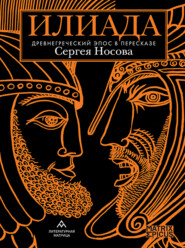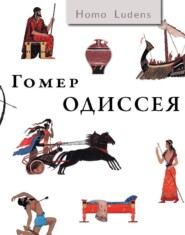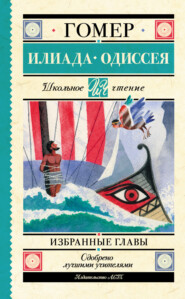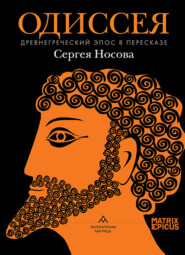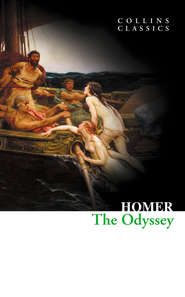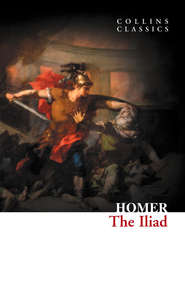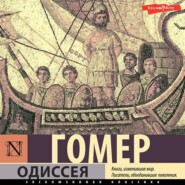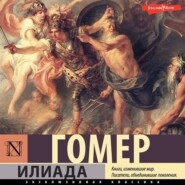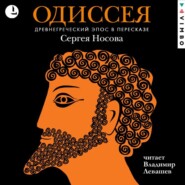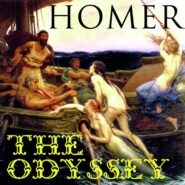По всем вопросам обращайтесь на: info@litportal.ru
(©) 2003-2024.
✖
The Iliad
Настройки чтения
Размер шрифта
Высота строк
Поля
So saying he gave her to his arms, and he gladly took his dear child; and anon they set in order for the god the holy hecatomb about his well-builded altar; next washed they their hands and took up the barley meal. Then Chryses lifted up his hands and prayed aloud for them: "Hearken to me, god of the silver bow that standest over Chryse and holy Killa, and rulest Tenedos with might; even as erst thou heardest my prayer, and didst me honour, and mightily afflictest the people of the Achaians, even so now fulfil me this my desire: remove thou from the Danaans forthwith the loathly pestilence."
So spake he in prayer, and Phoebus Apollo heard him. Now when they had prayed and sprinkled the barley meal, first they drew back the victims' heads and slaughtered them and flayed them, and cut slices from the thighs and wrapped them in fat, making a double fold, and laid raw collops thereon, and the old man burnt them on cleft wood and made libation over them of gleaming wine; and at his side the young men in their hands held five-pronged forks. Now when the thighs were burnt and they had tasted the vitals, then sliced they all the rest and pierced it through with spits, and roasted it carefully, and drew all off again. So when they had rest from the task and had made ready the banquet, they feasted, nor was their heart aught stinted of the fair banquet. But when they had put away from them the desire of meat and drink, the young men crowned the bowls with wine, and gave each man his portion after the drink-offering had been poured into the cups. So all day long worshipped they the god with music, singing the beautiful paean, the sons of the Achaians making music to the Far-darter [or, "the Averter" (of pestilence)]; and his heart was glad to hear. And when the sun went down and darkness came on them, they laid them to sleep beside the ship's hawsers; and when rosy-fingered Dawn appeared, the child of morning, then set they sail for the wide camp of the Achaians; and Apollo the Far-darter sent them a favouring gale. They set up their mast and spread the white sails forth, and the wind filled the sail's belly and the dark wave sang loud about the stem as the ship made way, and she sped across the wave, accomplishing her journey. So when they were now come to the wide camp of the Achaians, they drew up their black ship to land high upon the sands, and set in line the long props beneath her; and themselves were scattered amid their huts and ships.
But he sat by his swift-faring ships, still wroth, even the heaven-sprung son of Peleus, Achilles fleet of foot; he betook him neither to the assembly that is the hero's glory, neither to war, but consumed his heart in tarrying in his place, and yearned for the war-cry and for battle.
Now when the twelfth morn thereafter was come, then the gods that are for ever fared to Olympus all in company, led of Zeus. And Thetis forgat not her son's charge, but rose up from the sea-wave, and at early morn mounted up to great heaven and Olympus. There found she Kronos' son of the far-sounding voice sitting apart from all on the topmost peak of many-ridged Olympus. So she sat before his face and with her left hand clasped his knees, and with her right touched him beneath his chin, and spake in prayer to king Zeus son of Kronos: "Father Zeus, if ever I gave thee aid amid the immortal gods, whether by word or deed, fulfil thou this my desire: do honour to my son, that is doomed to earliest death of all men: now hath Agamemnon king of men done him dishonour, for he hath taken away his meed of honour and keepeth her of his own violent deed. But honour thou him, Zeus of Olympus, lord of counsel; grant thou victory to the Trojans the while until the Achaians do my son honour and exalt him with recompense."
So spake she; but Zeus the cloud-gatherer said no word to her, and sat long time in silence. But even as Thetis had clasped his knees, so held she by him clinging, and questioned him yet a second time: "Promise me now this thing verily, and bow thy head thereto; or else deny me, seeing there is naught for thee to fear; that I may know full well how I among all gods am least in honour."
Then Zeus the cloud-gatherer, sore troubled, spake to her: "Verily it is a sorry matter, if thou wilt set me at variance with Hera, whene'er she provoketh me with taunting words. Even now she upbraideth me ever amid the immortal gods, and saith that I aid the Trojans in battle. But do thou now depart again, lest Hera mark aught; and I will take thought for these things to fulfil them. Come now, I will bow my head to thee, that thou mayest be of good courage; for that, of my part, is the surest token amid the immortals; no word of mine is revocable nor false nor unfulfilled when the bowing of my head hath pledged it."
Kronion spake, and bowed his dark brow, and the ambrosial locks waved from the king's immortal head; and he made great Olympus quake.
Thus the twain took counsel and parted; she leapt therewith into the deep sea from glittering Olympus, and Zeus fared to his own palace. All the gods in company arose from their seats before their father's face; neither ventured any to await his coming, but stood up all before him. So he sate him there upon his throne; but Hera saw, and was not ignorant how that the daughter of the Ancient of the sea, Thetis the silver-footed, had devised counsel with him. Anon with taunting words spake she to Zeus the son of Kronos: "Now who among the gods, thou crafty of mind, hath devised counsel with thee? It is ever thy good pleasure to hold aloof from me and in secret meditation to give thy judgments, nor of thine own good will hast thou ever brought thyself to declare unto me the thing thou purposest."
Then the father of gods and men made answer her: "Hera, think not thou to know all my sayings; hard they are for thee, even though thou art my wife. But whichsoever it is seemly for thee to hear, none sooner than thou shall know, be he god or man. Only when I will to take thought aloof from the gods, then do not thou ask of every matter nor make question."
Then Hera the ox-eyed queen made answer to him. "Most dread son of Kronos, what word is this thou hast spoken? Yea, surely of old I have not asked thee nor made question, but in my heart sore afraid lest thou have been won over by silver-footed Thetis, daughter of the Ancient of the sea, for she at early morn sat by thee and clasped thy knees. To her I deem thou gavest a sure pledge that thou wilt do honour to Achilles, and lay many low beside the Achaians' ships."
To her made answer Zeus the cloud-gatherer: "Lady, Good lack! ever art thou imagining, nor can I escape thee; yet shalt thou in no wise have power to fulfil, but wilt be the further from my heart; that shall be even the worse for thee. And if it be so, then such must my good pleasure be. Abide thou in silence and hearken to my bidding, lest all the gods that are in Olympus keep not off from thee my visitation, when I put forth my hands unapproachable against thee."
He said, and Hera the ox-eyed queen was afraid, and sat in silence, curbing her heart; but throughout Zeus' palace the gods of heaven were troubled. Then Hephaistos the famed craftsman began to make harangue among them, to do kindness to his mother, white-armed Hera: "Verily this will be a sorry matter, neither any more endurable, if ye twain thus fight for mortals' sakes, and bring wrangling among the gods; neither will there any more be joy of the goodly feast, seeing that evil triumpheth. So I give counsel to my mother, though herself is wise, to do kindness to our dear father Zeus, that our father upbraid us not again and cast the banquet in confusion. What if the Olympian, the lord of the lightning, will to dash us from our seats! for he is strongest far. Nay, approach thou him with gentle words, then will the Olympian forthwith be gracious unto us."
So speaking he rose up and sat in his dear mother's hand the twy-handled cup, and spake to her: "Be of good courage, mother mine, and endure, though thou art vexed, lest I behold thee, thou art so dear, chastised before mine eyes, and then shall I not be able for all my sorrow to save thee; for the Olympian is a hard foe to face. Yea, once ere this, when I was fain to save thee, he caught me by my foot and hurled me from the heavenly threshold; all day I flew, and at the set of sun I fell in Lemnos, and little life was in me. There did the Sintian folk forthwith tend me for my fall."
He spake, and the white-armed goddess Hera smiled, and smiling took the cup at her son's hand. Then he poured wine to all the other gods from right to left, ladling the sweet nectar from the bowl. And laughter unquenchable arose amid the blessed gods to see Hephaistos bustling through the palace.
So feasted they all day till the setting of the sun; nor was their soul aught stinted of the fair banquet, nor of the beauteous lyre that Apollo held, and the Muses singing alternately with sweet voice.
Now when the bright light of the sun was set, these went each to his own house to sleep, where each one had his palace made with cunning device by famed Hephaistos the lame god; and Zeus the Olympian, the lord of lightning, departed to his couch where he was wont of old to take his rest, whenever sweet sleep visited him. There went he up and slept, and beside him was Hera of the golden throne.
BOOK II
Now all other gods and chariot-driving men slept all night long, only Zeus was not holden of sweet sleep; rather was he pondering in his heart how he should do honour to Achilles and destroy many beside the Achaians' ships. And this design seemed to his mind the best, to wit, to send a baneful dream upon Agamemnon son of Atreus. So he spake, and uttered to him winged words: "Come now, thou baneful Dream, go to the Achaians' fleet ships, enter into the hut of Agamemnon son of Atreus, and tell him every word plainly as I charge thee. Bid him call to arms the flowing-haired Achaians with all speed, for that now he may take the wide-wayed city of the Trojans. For the immortals that dwell in the halls of Olympus are no longer divided in counsel, since Hera hath turned the minds of all by her beseeching, and over the Trojans sorrows hang."
So spake he, and the Dream went his way when he had heard the charge. With speed he came to the Achaians' fleet ships, and went to Agamemnon son of Atreus, and found him sleeping in his hut, and ambrosial slumber poured over him. So he stood over his head in seeming like unto the son of Neleus, even Nestor, whom most of all the elders Agamemnon honoured; in his likeness spake to him the heavenly Dream:
"Sleepest thou, son of wise Atreus tamer of horses? To sleep all night through beseemeth not one that is a counsellor, to whom peoples are entrusted and so many cares belong. But now hearken straightway to me, for I am a messenger to thee from Zeus, who though he be afar yet hath great care for thee and pity. He biddeth thee call to arms the flowing-haired Achaians with all speed, for that now thou mayest take the wide-wayed city of the Trojans. For the immortals that dwell in the halls of Olympus are no longer divided in counsel, since Hera hath turned the minds of all by her beseeching, and over the Trojans sorrows hang by the will of Zeus. But do thou keep this in thy heart, not let forgetfulness come upon thee when honeyed sleep shall leave thee."
So spake the Dream, and departed and left him there, deeming in his mind things that were not to be fulfilled. For indeed he thought to take Priam's city that very day; fond man, in that he knew not the plans that Zeus had in mind, who was willed to bring yet more grief and wailing on Trojans alike and Danaans throughout the course of stubborn fights. Then woke he from sleep, and the heavenly voice was in his ears. So he rose up sitting, and donned his soft tunic, fair and bright, and cast around him his great cloak, and beneath his glistering feet he bound his fair sandals, and over his shoulders cast his silver-studded sword, and grasped his sires' sceptre, imperishable for ever, wherewith he took his way amid the mail-clad Achaians' ships.
Now went the goddess Dawn to high Olympus, foretelling daylight to Zeus and all the immortals; and the king bade the clear-voiced heralds summon to the assembly the flowing-haired Achaians. So did those summon, and these gathered with speed.
But first the council of the great-hearted elders met beside the ship of king Nestor the Pylos-born. And he that had assembled them framed his cunning counsel: "Hearken, my friends. A dream from heaven came to me in my sleep through the ambrosial night, and chiefly to goodly Nestor was very like in shape and bulk and stature. And it stood over my head and charged me saying: 'Sleepest thou, son of wise Atreus tamer of horses? To sleep all night through beseemeth not one that is a counsellor, to whom peoples are entrusted and so many cares belong. But now hearken straightway to me, for I am a messenger to thee from Zeus, who though he be afar yet hath great care for thee and pity. He biddeth thee call to arms the flowing-haired Achaians with all speed, for that now thou mayest take the wide-wayed city of the Trojans. For the immortals that dwell in the palaces of Olympus are no longer divided in counsel, since Hera hath turned the minds of all by her beseeching, and over the Trojans sorrows hang by the will of Zeus. But do thou keep this in thy heart.' So spake the dream and was flown away, and sweet sleep left me. So come, let us now call to arms as we may the sons of the Achaians. But first I will speak to make trial of them as is fitting, and bid them flee with their benched ships; only do ye from this side and from that speak to hold them back."
So spake he and sate him down; and there stood up among them Nestor, who was king of sandy Pylos. He of good intent made harangue to them and said: "My friends, captains and rulers of the Argives, had any other of the Achaians told us this dream we might deem it a false thing, and rather turn away therefrom; but now he hath seen it who of all Achaians avoweth himself far greatest. So come, let us call to arms as we may the sons of the Achaians."
So spake he, and led the way forth from the council, and all the other sceptred chiefs rose with him and obeyed the shepherd of the host; and the people hastened to them. Even as when the tribes of thronging bees issue from the hollow rock, ever in fresh procession, and fly clustering among the flowers of spring, and some on this hand and some on that fly thick; even so from ships and huts before the low beach marched forth their many tribes by companies to the place of assembly. And in their midst blazed forth Rumour, messenger of Zeus, urging them to go; and so they gathered. And the place of assemblage was in an uproar, and the earth echoed again as the hosts sate them down, and there was turmoil. Nine heralds restrained them with shouting, if perchance they might refrain from clamour, and hearken to their kings, the fosterlings of Zeus. And hardly at the last would the people sit, and keep them to their benches and cease from noise. Then stood up lord Agamemnon bearing his sceptre, that Hephaistos had wrought curiously. Hephaistos gave it to king Zeus son of Kronos, and then Zeus gave it to the messenger-god the slayer of Argus [Or, possibly, "the swift-appearing"]; and king Hermes gave it to Pelops the charioteer, and Pelops again gave it to Atreus shepherd of the host. And Atreus dying left it to Thyestes rich in flocks, and Thyestes in his turn left it to Agamemnon to bear, that over many islands and all Argos he should be lord. Thereon he leaned and spake his saying to the Argives:
"My friends, Danaan warriors, men of Ares' company, Zeus Kronos' son hath bound me with might in grievous blindness of soul; hard of heart is he, for that erewhile he promised me and pledged his nod that not till I had wasted well-walled Ilios should I return; but now see I that he planned a cruel wile and biddeth me return to Argos dishonoured, with the loss of many of my folk. So meseems it pleaseth most mighty Zeus, who hath laid low the head of many a city, yea, and shall lay low; for his is highest power. Shame is this even for them that come after to hear; how so goodly and great a folk of the Achaians thus vainly warred a bootless war, and fought scantier enemies, and no end thereof is yet seen. For if perchance we were minded, both Achaians and Trojans, to swear a solemn truce, and to number ourselves, and if the Trojans should gather together all that have their dwellings in the city, and we Achaians should marshal ourselves by tens, and every company choose a Trojan to pour their wine, then would many tens lack a cup-bearer: so much, I say, do the sons of the Achaians outnumber the Trojans that dwell within the city. But allies from many cities, even warriors that wield the spear, are therein, and they hinder me perforce, and for all my will suffer me not to waste the populous citadel of Ilios. Already have nine years of great Zeus passed away, and our ships' timbers have rotted and the tackling is loosed; while there our wives and little children sit in our halls awaiting us; yet is our task utterly unaccomplished wherefor we came hither. So come, even as I bid let us all obey. Let us flee with our ships to our dear native land; for now shall we never take wide-wayed Troy."
So spake he, and stirred the spirit in the breasts of all throughout the multitude, as many as had not heard the council. And the assembly swayed like high sea-waves of the Icarian Main that east wind and south wind raise, rushing upon them from the clouds of father Zeus; and even as when the west wind cometh to stir a deep cornfield with violent blast, and the ears bow down, so was all the assembly stirred, and they with shouting hasted toward the ships; and the dust from beneath their feet rose and stood on high. And they bade each man his neighbor to seize the ships and drag them into the bright salt sea, and cleared out the launching-ways, and the noise went up to heaven of their hurrying homewards; and they began to take the props from beneath the ships.
Then would the Argives have accomplished their return against the will of fate, but that Hera spake a word to Athene: "Out on it, daughter of aegis-bearing Zeus, unwearied maiden! Shall the Argives thus indeed flee homeward to their dear native land over the sea's broad back? But they would leave to Priam and the Trojans their boast, even Helen of Argos, for whose sake many an Achaian hath perished in Troy, far away from his dear native land. But go thou now amid the host of the mail-clad Achaians; with thy gentle words refrain thou every man, neither suffer them to draw their curved ships down to the salt sea."
So spake she, and the bright-eyed goddess Athene disregarded not; but went darting down from the peaks of Olympus, and came with speed to the fleet ships of the Achaians. There found she Odysseus standing, peer of Zeus in counsel, neither laid he any hand upon his decked black ship, because grief had entered into his heart and soul. And bright-eyed Athene stood by him and said: "Heaven-sprung son of Laertes, Odysseus of many devices, will ye indeed fling yourselves upon your benched ships to flee homeward to your dear native land? But ye would leave to Priam and the Trojans their boast, even Helen of Argos, for whose sake many an Achaian hath perished in Troy, far from his dear native land. But go thou now amid the host of the Achaians, and tarry not; and with gentle words refrain every man, neither suffer them to draw their curved ships down to the salt sea."
So said she, and he knew the voice of the goddess speaking to him, and set him to run, and cast away his mantle, the which his herald gathered up, even Eurybated of Ithaca, that waited on him. And himself he went to meet Agamemnon son of Atreus, and at his hand received the sceptre of his sires, imperishable for ever, wherewith he took his way amid the ships of the mail-clad Achaians.
Whenever he found one that was a captain and a man of mark, he stood by his side, and refrained him with gentle words: "Good sir, it is not seemly to affright thee like a coward, but do thou sit thyself and make all thy folk sit down. For thou knowest not yet clearly what is the purpose of Atreus' son; now is he but making trial, and soon he will afflict the sons of the Achaians. And heard we not all of us what he spake in the council? Beware lest in his anger he evilly entreat the sons of the Achaians. For proud is the soul of heaven-fostered kings; because their honour is of Zeus, and the god of counsel loveth them."
But whatever man of the people he saw and found him shouting, him he drave with his sceptre and chode him with loud words: "Good sir, sit still and hearken to the words of others that are thy betters; but thou art no warrior, and a weakling, never reckoned whether in battle or in council. In no wise can we Achaians all be kings here. A multitude of masters is no good thing; let there be one master, one king, to whom the son of crooked-counselling Kronos hath granted it, [even the sceptre and judgments, that he may rule among you"].
So masterfully ranged he the host; and they hasted back to the assembly from ships and huts, with noise as when a wave of loud-sounding sea roareth on the long beach and the main resoundeth.
Now all the rest sat down and kept their place upon the benches, only Thersites still chattered on, the uncontrolled speech, whose mind was full of words many and disorderly, wherewith to strive against the chiefs idly and in no good order, but even as he deemed that he should make the Argives laugh. And he was ill-favored beyond all men that came to Ilios. Bandy-legged was he, and lame of one foot, and his two shoulders rounded, arched down upon his chest; and over them his head was warped, and a scanty stubble sprouted on it. Hateful was he to Achilles above all and to Odysseus, for them he was wont to revile. But now with shrill shout he poured forth his upbraidings upon goodly Agamemnon. With him the Achaians were sore vexed and had indignation in their souls. But he with loud shout spake and reviled Agamemnon: "Atreides, for what art thou now ill content and lacking? Surely thy huts are full of bronze and many women are in they huts, the chosen spoils that we Achaians give thee first of all, whene'er we take a town. Can it be that thou yet wantest gold as well, such as some one of the horse-taming Trojans may bring from Ilios to ransom his son, whom I perchance or some other Achaian have led captive; or else some young girl, to know in love, whom thou mayest keep apart to thyself? But it is not seemly for one that is their captain to bring the sons of the Achaians to ill. Soft fools, base things of shame, ye women of Achaia and men no more, let us depart home with our ships, and leave this fellow here in Troy-land to gorge him with meeds of honour, that he may see whether our aid avail him aught or no; even he that hath now done dishonour to Achilles, a far better man than he; for he hath taken away his meed of honour and keepeth it by his own violent deed. Of a very surety is there no wrath at all in Achilles' mind, but he is slack; else this despite, thou son of Atreus, were thy last."
So spake Thersites, reviling Agamemnon shepherd of the host. But goodly Odysseus came straight to his side, and looking sternly at him with hard words rebuked him: "Thersites, reckless in words, shrill orator though thou art, refrain thyself, nor aim to strive singly against kings. For I deem that no mortal is baser than thou of all that with the sons of Atreus came before Ilios. Therefore were it well that thou shouldest not have kings in thy mouth as thou talkest, and utter revilings against them and be on the watch for departure. We know not yet clearly how these things shall be, whether we sons of the Achaians shall return for good or ill. Therefore now dost thou revile continually Agamemnon son of Atreus, shepherd of the host, because the Danaan warriors give him many gifts, and so thou talkest tauntingly. But I will tell thee plain, and that I say shall even be brought to pass: if I find thee again raving as now thou art, then may Odysseus' head no longer abide upon his shoulders, nor may I any more be called father of Telemachos, if I take thee not and strip from thee thy garments, thy mantle and tunic that cover thy nakedness, and for thyself send thee weeping to the fleet ships, and beat thee out of the assembly with shameful blows."
So spake he, and with his staff smote his back and shoulders: and he bowed down and a big tear fell from him, and a bloody weal stood up from his back beneath the golden sceptre. Then he sat down and was amazed, and in pain with helpless look wiped away the tear. But the rest, though they were sotty, laughed lightly at him, and thus would one speak looking at another standing by: "Go to, of a truth Odysseus hath wrought good deeds without number ere now, standing foremost in wise counsels and setting battle in array, but now is this thing the best by far that he hath wrought among the Argives, to wit, that he hath stayed this prating railer from his harangues. Never again, forsooth, will his proud soul henceforth bid him revile the kings with slanderous words."
So said the common sort; but up rose Odysseus waster of cities, with sceptre in his hand. And by his side bright-eyed Athene in the likeness of a herald bade the multitude keep silence, that the sons of the Achaians, both the nearest and the farthest, might hear his words together and give heed to his counsel. He of good intent made harangue to them and said: "Atreides, now surely are the Achaians for making thee, O king, most despised among all mortal men, nor will they fulfil the promise that they pledged thee when they still were marching hither from horse-pasturing Argos; that thou shouldest not return till thou hadst laid well-walled Ilios waste. For like young children or widow women do they wail each to the other of returning home. Yea, here is toil to make a man depart disheartened. For he that stayeth away but one single month far from his wife in his benched ship fretteth himself when winter storms and the furious sea imprison him; but for us, the ninth year of our stay here is upon us in its course. Therefore do I not marvel that the Achaians should fret beside their beaked ships; yet nevertheless is it shameful to wait long and to depart empty. Be of good heart, my friends, and wait a while, until we learn whether Kalchas be a true prophet or no. For this thing verily we know well in our hearts, and ye all are witnesses thereof, even as many as the fates of death have not borne away. It was as it were but yesterday or the day before that the Achaians' ships were gathering in Aulis, freighted with trouble for Priam and the Trojans; and we round about a spring were offering on the holy altars unblemished hecatombs to the immortals, beneath a fair plane-tree whence flowed bright water, when there was seen a great portent: a snake blood-red on the back, terrible, whom the god of Olympus himself had sent forth to the light of day, sprang from beneath the altar and darted to the plane-tree. Now there were there the brood of a sparrow, tender little ones, upon the topmost branch, nestling beneath the leaves; eight were they and the mother of the little ones was the ninth, and the snake swallowed these cheeping pitifully. And the mother fluttered around wailing for her dear little ones; but he coiled himself and caught her by the wing as she screamed about him. Now when he had swallowed the sparrow's little ones and the mother with them, the god who revealed him made of him a sign; for the son of crooked-counselling Kronos turned him to stone, and we stood by and marvelled to see what was done. So when the dread portent brake in upon the hecatombs of the gods, then did Kalchas forthwith prophesy, and said: 'Why hold ye your peace, ye flowing-haired Achaians? To us hath Zeus the counsellor shown this great sign, late come, of late fulfilment, the fame whereof shall never perish. Even as he swallowed the sparrow's little ones and herself, the eight wherewith the mother that bare the little ones was the ninth, so shall we war there so many years, but in the tenth year shall we take the wide-wayed city.' So spake the seer; and now are all these things being fulfilled. So come, abide ye all, ye well-greaved Achaians, even where ye are, until we have taken the great city of Priam."
So spake he, and the Argives shouted aloud, and all round the ships echoed terribly to the voice of the Achaians as they praised the saying of god-like Odysseus. And then spake among them knightly Nestor of Gerenia: "Out on it; in very truth ye hold assembly like silly boys that have no care for deeds of war. What shall come of our covenants and our oaths? Let all counsels be cast into the fire and all devices of warriors and the pure drink-offerings and the right hands of fellowship wherein we trusted. For we are vainly striving with words nor can we find any device at all, for all our long tarrying here. Son of Atreus, do thou still, as erst, keep steadfast purpose and lead the Argives amid the violent fray; and for these, let them perish, the one or two Achaians that take secret counsel – to depart to Argos first, before they know whether the promise of aegis-bearing Zeus be a lie or no. Yea, for I say that most mighty Kronion pledged us his word that day when the Argives embarked upon their fleet ships, bearing unto the Trojans death and fate; for by his lightning upon our right he manifested signs of good. Therefore let Trojan's wife and paid back his strivings and groans for Helen's sake. But if any man is overmuch desirous to depart homewards, let him lay his hand upon his decked black ship, that before all men he may encounter death and fate. But do thou, my king, take good counsel thyself, and whate'er it be, shall not be cast away. Separate thy warriors by tribes and by clans, Agamemnon, that clan may give aid to clan and tribe to tribe. If thou do thus and the Achaians hearken to thee, then wilt thou know who among thy captains and who of the common sort is a coward, and who too is brave; for they will fight each after their sort. So wilt thou know whether it is even by divine command that thou shalt not take the city, or by the baseness of thy warriors and their ill skill in battle."
And lord Agamemnon answered and said to him: "Verily hast thou again outdone the sons of the Achaians in speech, old man. Ah, father Zeus and Athene and Apollo, would that among the Achaians I had ten such councillors; then would the city of king Priam soon bow beneath our hands, captive and wasted. But aegis-bearing Zeus, the son of Kronos, hath brought sorrows upon me, in that he casteth my lot amid fruitless wranglings and strifes. For in truth I and Achilles fought about a damsel with violent words, and I was first to be angry; but if we can only be at one in council, then will there no more be any putting off the day of evil for the Trojans, no not for an instant. But now go ye to your meal that we may join battle. Let each man sharpen well his spear and bestow well his shield, and let him well give his fleet-footed steeds their meal, and look well to his chariot on every side and take thought for battle, that all day long we may contend in hateful war. For of respite shall there intervene no, not a whit, only that the coming of night shall part the fury of warriors. On each man's breast shall the baldrick of his covering shield be wet with sweat, and his hand shall grow faint about the spear, and each man's horse shall sweat as he draweth the polished chariot. And whomsoever I perceive minded to tarry far from the fight beside the beaked ships, for him shall there be no hope hereafter to escape the dogs and birds of prey."
So spake he, and the Argives shouted aloud, like to a wave on a steep shore, when the south wind cometh and stirreth it; even on a jutting rock, that is never left at peace by the waves of all winds that rise from this side and from that. And they did sacrifice each man to one of the everlasting gods, praying for escape from death and the tumult of battle. But Agamemnon king of men slew a fat bull of five years to most mighty Kronion, and called the elders, the princes of the Achaian host, Nestor first and king Idomeneus, and then the two Aiantes and Tydeus' son, and sixthly Odysseus peer of Zeus in counsel. And Menelaos of the loud war-cry came to him unbidden, for he knew in his heart how his brother toiled. Then stood they around the bull and took the barley-meal. And Agamemnon made his prayer in their midst and said: "Zeus, most glorious, most great, god of the storm-cloud, that dwellest in the heaven, vouchsafe that the sun set not upon us nor the darkness come near, till I have laid low upon the earth Priam's palace smirched with smoke, and burnt the doorways thereof with consuming fire, and rent on Hector's breast his doublet cleft with the blade; and about him may full many of his comrades prone in the dust bite the earth."
So spake he, but not as yet would Kronion grant him fulfilment; he accepted the sacrifice, but made toil to wax increasingly.
Now when they had prayed and sprinkled the barley-meal they first drew back the bull's head and cut his throat and flayed him, and cut slices from the thigh's and wrapped them in fat, making a double fold, and laid raw collops thereon. And these they burnt on cleft wood stript of leaves, and spitted the vitals and held them over Hephaistos' flame. Now when the thighs were burnt and they had tasted the vitals, then sliced they all the rest and pierced it through with spits, and roasted it carefully and drew all off again. So when they had rest from the task and had made ready the banquet, they feasted, nor was their heart aught stinted of the fair banquet. But when they had put away from them the desire of meat and drink, then did knightly Nestor of Gerenia open his saying to them: "Most noble son of Atreus, Agamemnon king of men, let us not any more hold long converse here, nor for long delay the work that god putteth in our hands; but come, let the heralds of the mail-clad Achaians make proclamation to the folk and gather them throughout the ships; and let us go thus in concert through the wide host of the Achaians, that the speedier we may arouse keen war."
So spake he and Agamemnon king of men disregarded not. Straightway he bade the clear-voiced heralds summon to battle the flowing-haired Achaians. So those summoned and these gathered with all speed. And the kings, the fosterlings of Zeus that were about Atreus' son, eagerly marshalled them, and bright-eyed Athene in the midst, bearing the holy aegis that knoweth neither age nor death, whereon wave an hundred tassels of pure gold, all deftly woven and each one an hundred oxen worth. Therewith she passed dazzling through the Achaian folk, urging them forth; and in every man's heart she roused strength to battle without ceasing and to fight. So was war made sweeter to them than to depart in their hollow ships to their dear native land. Even as ravaging fire kindleth a boundless forest on a mountain's peaks, and the blaze is seen from afar, even so as they marched went the dazzling gleam from the innumerable bronze through the sky even unto the heavens.
And as the many tribes of feathered birds, wild geese or cranes or long-necked swans, on the Asian mead by Kaystrios' stream, fly hither and thither joying in their plumage, and with loud cries settle ever onwards, and the mead resounds; even so poured forth the many tribes of warriors from ships and huts into the Skamandrian plain. And the earth echoed terribly beneath the tread of men and horses. So stood they in the flowery Skamandrian plain, unnumbered as are leaves and flowers in their season. Even as the many tribes of thick flies that hover about a herdsman's steading in the spring season, when milk drencheth the pails, even in like number stood the flowing-haired Achaians upon the plain in face of the Trojans, eager to rend them asunder. And even as the goatherds easily divide the ranging flocks of goats when they mingle in the pasture, so did their captains marshal them on this side and that, to enter into the fray, and in their midst lord Agamemnon, his head and eyes like unto Zeus whose joy is in the thunder, and his waist like unto Ares and his breast unto Poseidon. Even as a bull standeth out far foremost amid the herd, for his is pre-eminent amid the pasturing kine, even such did Zeus make Atreides on that day, pre-eminent among many and chief amid heroes.
Tell me now, ye Muses that dwell in the mansions of Olympus – seeing that ye are goddesses and are at hand and know all things, but we hear only a rumour and know not anything – who were the captains of the Danaans and their lords. But the common sort could I not number nor name, nay, not if ten tongues were mine and ten mouths, and a voice unwearied, and my heart of bronze within me, did not the Muses of Olympus, daughters of aegis-bearing Zeus, put into my mind all that came to Ilios. So will I tell the captains of the ships and all the ships in order.
Of the Boiotians Peneleos and Leitos were captains, and Arkesilaos and Prothoenor and Klonios; these were they that dwelt in Hyria and rocky Aulis and Schoinos and Skolos and Eteonos full of ridges, Thespeia and Graia and Mykalessos with wide lawns; and that dwelt about Harma and Eilesion and Erythrai, and they that possessed Eleon and Peteon and Hyle, Okalea and the stablished fortress of Medeon, Kopai and Eutresis and Thisbe haunt of doves; and they of Koroneia and grassy Haliartos, and that possessed Plataia and that dwelt in Glisas, and that possessed the stablished fortress of lesser Thebes and holy Onchestos, Poseidon's bright grove; and that possessed Arne rich in vineyards, and Mideia and sacred Nisa and Anthedon on the furthest borders. Of these there came fifty ships, and in each one embarked young men of the Boiotians an hundred and twenty. And they that dwelt in Aspledon and Orchomenos of the Minyai were led of Askalaphos and Ialmenos, sons of Ares, whom Astyoche conceived of the mighty god in the palace of Aktor son of Azeus, having entered her upper chamber, a stately maiden; for mighty Ares lay with her privily. And with them sailed thirty hollow ships.
And the Phokians were led of Schedios and Epistrophos, sons of great-hearted Iphitos son of Naubolos; these were they that possessed Kyparissos and rocky Pytho and sacred Krisa and Daulis and Panopeus, and they that dwelt about Anemoreia and Hyampolis, yea, and they that lived by the goodly river Kephisos and possessed Lilaia by Kephisos' springs. And with them followed thirty black ships. So they marshalled the ranks of the Phokians diligently, and had their station hard by the Boiotians on the left.
And of the Lokrians the fleet son of Oileus was captain, Aias the less, that was not so great as was the Telamonian Aias but far less. Small was he, with linen corslet, but with the spear he far outdid all the Hellenes and Achaians. These were they that dwelt in Kynos and Opus and Kalliaros and Bessa and Skarphe and lovely Augeiai and Tarphe and Thronion, about the streams of Boagrios. And with Aias followed forty black ships of the Lokrians that dwell over against holy Euboia.
And the Abantes breathing fury, they that possessed Euboia and Chalkis and Eiretria and Histiaia rich in vines, and Kerinthos by the sea and the steep fortress of Dios and they that possessed Karytos, and they that dwelt in Styra, all these again were led of Elephenor of the stock of Ares, even the son of Chalkodon, and captain of the proud Abantes. And with him followed the fleet Abantes with hair flowing behind, spearmen eager with ashen shafts outstretched to tear the corslets on the breasts of the foes. And with him forty black ships followed.
And they that possessed the goodly citadel of Athens, the domain of Erechtheus the high-hearted, whom erst Athene daughter of Zeus fostered when Earth, the grain-giver, brought him to birth; – and she gave him a resting-place in Athens in her own rich sanctuary; and there the sons of the Athenians worship him with bulls and rams as the years turn in their courses – these again were led of Menestheus son of Peteos. And there was no man upon the face of earth that was like him for the marshalling of horsemen and warriors that bear the shield. Only Nestor rivalled him, for he was the elder by birth. And with him rivalled him, for he was the elder by birth. And with him fifty black ships followed.






